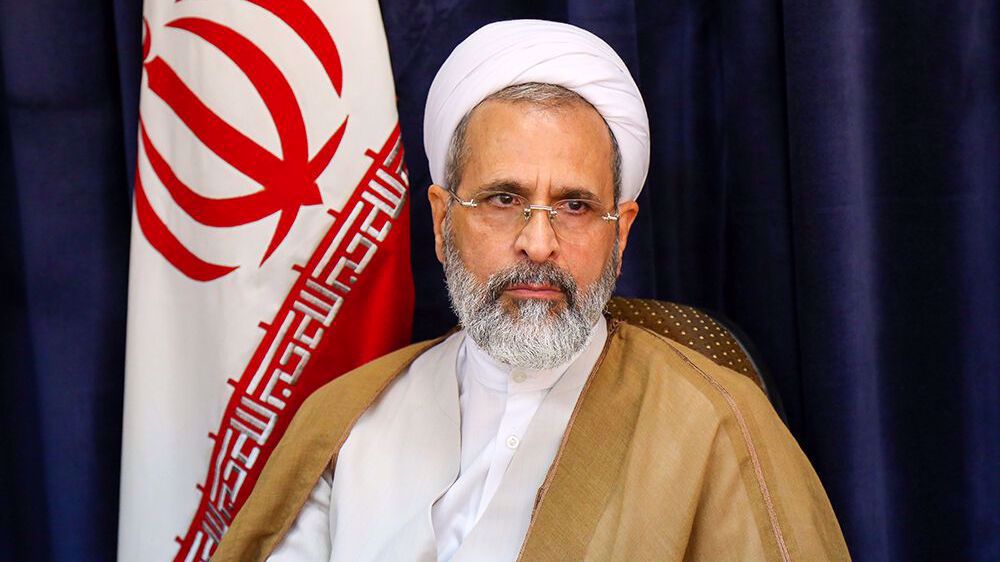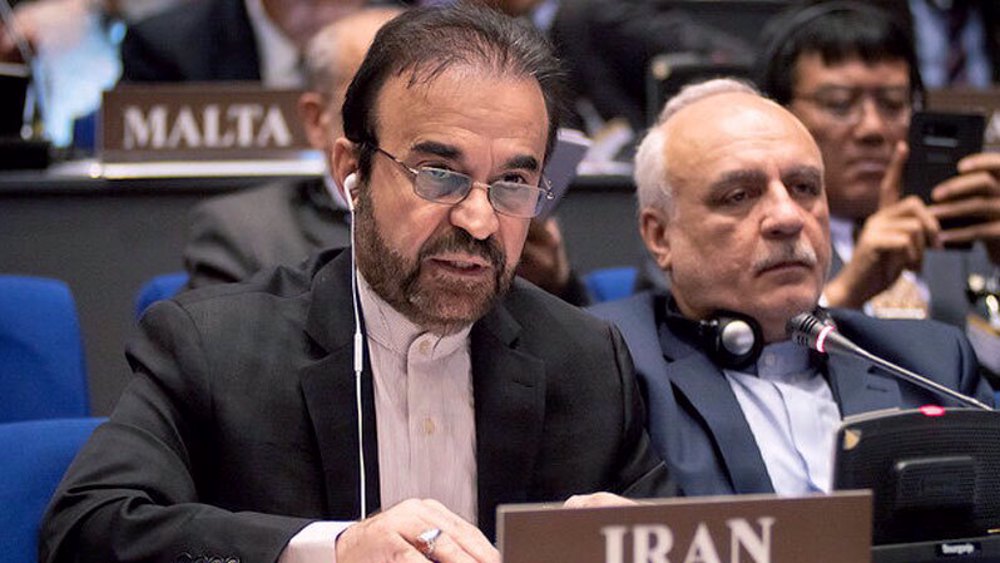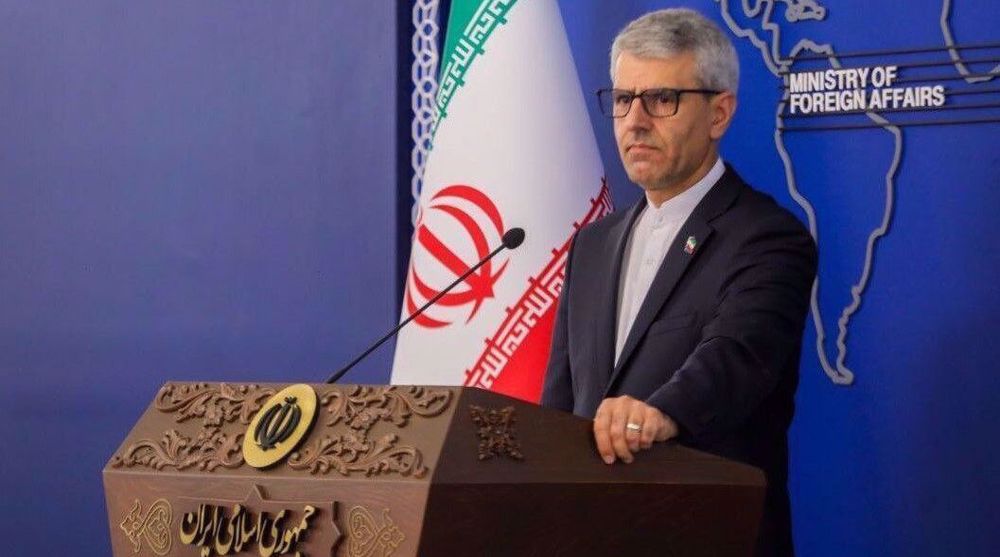Rhetoric on Iran deal has hurt US stature: Zarif
Iran’s Foreign Minister Mohammad Javad Zarif says the United States’ belligerent rhetoric on a multilateral deal with Iran has impacted other countries’ faith in potentially negotiating with Washington.
In an interview with the Iranian Borna News, which was published on Sunday, Foreign Minister Zarif referred to the “very dangerous” tensions between the US and North Korea and implied that Pyongyang was not interested in talking to Washington to defuse the tensions because of the US’s past behavior.
Dialog was badly needed, he said however.
“The situation is very dangerous. I do not recall any time in my 40 years in politics when there was talk [of using nuclear weapons] in the international community,” he said.
Tensions have been running high between the US and North Korea in recent months. Pyongyang has been swiftly advancing its missile and military nuclear programs, which Washington perceives as a threat to itself and its allies in East Asia.

Both sides have been threatening one another with military action, and the prospect of a nuclear confrontation remains on the horizon. On September 3, North Korea conducted a nuclear test — its sixth overall — and said it was now capable of building a nuclear warhead small enough to fit on a missile.
The US, which has permanent military presence in the region, angrily reacted to the test. Washington has reportedly prepared a sanctions resolution, which it plans to table at the United Nations Security Council on Monday. Trump has not ruled out military action against North Korea.
Zarif said a solution had to be reached peacefully, and threats and pressure had to be avoided.
He said that the US, however, suffered from a reputation problem and negotiating with it was not viewed as a favorable option.
“Some of the rhetoric that the US has adopted about the JCPOA since Mr. Trump took office has cast doubt about the US’s reputation as a [credible] negotiating partner,” the Iranian foreign minister said, referring to the Iran deal by its official abbreviation.
“Other countries, too, feel that this administration is not trustworthy. The US’s own allies in Europe say that, too,” he said.
Zarif added that the proliferation of nuclear weapons had to stop and all such weapons in the world had to be destroyed.
As foreign minister, Zarif was Iran’s chief negotiator in long-running talks in 2013 to 2015 that culminated in the Iran deal, known as the Joint Comprehensive Plan of Action, or the JCPOA.
The US was a party to the talks and is a party to the deal. But the new American president, Trump, has called the deal the “worst” he has ever seen and has been publicly undermining it.
Zarif has said before that the Trump administration has violated the text of the deal by attempting to discourage Iran’s European partners from doing business with Iran.
Iran and the other parties to the deal — namely the UK, France, Russia, China, and Germany — have stressed that the agreement should be sustained.
‘Iran has options’
In the interview with Borna News, Zarif said while Iran tried to maintain the agreement as it was, Tehran had the option of withdrawal.
He said another option was to “create conditions in which America’s withdrawal from or non-performance of the JCPOA would lead to the US’s isolation.”
He referred to the fact that the Trump administration has twice verified Iranian compliance with the deal to the US Congress, adding that happened despite the White House’s skepticism because Washington knew that acting otherwise would lead to its isolation.
The European parties to the deal as well as China and Russia are opposed to the re-imposition of any nuclear sanctions on Iran because Tehran has been confirmed in full compliance with the deal by the International Atomic Energy Agency (IAEA).
The IAEA is the official institution in charge of verification of Iranian compliance, and the US has in the recent past attempted —although unsuccessfully — to sway the agency’s reporting on Iran.
‘World has failed Rohingya Muslims’
Elsewhere in his remarks, the Iranian foreign minister referred to the crisis in Myanmar, where the government is carrying out a deadly crackdown on minority Rohingya Muslims.
“The situation is outrageous in Myanmar,” he said. “The international community has once again failed to uphold the rights of the oppressed and the people who face torture, pressure, and even genocide.”

He said Iran had engaged in diplomacy to facilitate a peaceful end to the plight of the Rohingya Muslims in Myanmar but stressed that the Islamic Republic did not seek to pressure the Myanmarese government.
“All we seek is find a solution to improve the situation,” he said.
Myanmar has laid a siege to a western state where the Rohingya are concentrated. There, horrific violence has been taking place against the minority Muslims, according to reports and eyewitnesses.

Soldiers and extremist Buddhists have reportedly been killing or raping the Muslims and setting their homes on fire. The Myanmarese government says 400 people, mostly Muslims, have died in the violence. The UN says the actual number likely tops 1,000.
On Saudi Arabia
Zarif was also asked about Saudi Arabia, which has severed its diplomatic relations with Iran. He said Riyadh had to reach a better understanding of the region before an enhancement of relations with Iran could take place.
“We hope the Saudi government reaches a real understanding of the situation in the region and the policies it has adopted in Syria, Iraq, Bahrain, and especially Yemen, where we face a humanitarian situation,” he said.
The Saudi government has had nothing to gain from those activities, he added.
Once Saudi Arabia gets a real understanding of the situation in the region, “it will see that Iran is prepared for positive interaction,” Zarif said.
Asked about recent remarks by Saudi Foreign Minister Adel al-Jubeir, who described earlier comments by Zarif as “laughable,” the Iranian foreign minister declined to comment.
“I usually don’t respond to remarks that are not based on reason and rationality,” he said.
Attacks on hospitals, schools ‘strike at life itself’: Pezeshkian
Iran’s attacks on US bases ‘legitimate’ response to source of aggression: Araghchi
IRGC targets US intelligence centers, military depots in 11th wave of attacks
US-Israeli attacks damage 5 hospitals, medical centers in Iran: MP
Unlike US, Iran prepared for a long war: Security chief
Missile sirens will never stop in Israeli-occupied territories, Iran warns
Leader’s martyrdom will drive Iran to greater dignity and victory: Senior cleric
Iran calls on IAEA to condemn fresh US-Israeli attacks on nuclear site

















 This makes it easy to access the Press TV website
This makes it easy to access the Press TV website